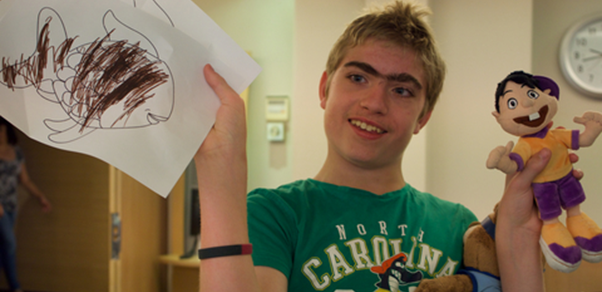Health in Kleefstra Syndrome
Hypotonia
Hypotonia (poor muscle tone) is sometimes called ’floppy baby syndrome’ and is often associated with reduced muscle strength. For babies with Kleefstra syndrome, poor muscle tone can also lead to difficulty with breastfeeding and therefore difficulty with meeting their nutritional needs. In most cases, babies can be given a high calorie supplement to support them during infancy. Hypotonia can also affect chewing. In these cases, children will need their food cut up into very small pieces.
Reflux
Many individuals with Kleefstra syndrome experience painful gastro-oesophageal reflux disease (GORD), which is when acid from the stomach leaks out up into the oesophagus. This condition usually improves after milk feeding ends; however, for some children it can persist. Painful health conditions such as GORD are linked to self-injurious and aggressive behaviours in people with intellectual disability so health conditions should be always ruled out if individuals are showing these behaviours. To download a guide about the assessment and treatment of pain in intellectual disability click the link below:
CLICK AND DOWNLOAD
Pain in children with severe intellectual disability: A Guide for Parents
Constipation
Constipation is very common for individuals with Kleefstra syndrome; however, symptoms can be reduced with stool softening medication.
Epilepsy
Many children with Kleefstra syndrome will have seizures. The most common seizures are infantile spasms, which usually occur during the first 12 months. Most babies grow out of these seizures once they are controlled by medication.
Other types of seizures are absence seizures (periods of awareness sometimes accompanied with staring, only lasting a brief amount of time) and febrile convulsions (a seizure that occurs when a child has a fever). For many children, seizures become less of a problem once they are well-managed with medication.
Heart defects
Research states that over half of babies with Kleefstra syndrome are born with structural heart defects. The most common defect is a hole in the heart. Heart defects affect each child differently with some not showing any obvious effects whilst other children show more obvious signs (for example, skin growing pale or becoming breathless when feeding).
For some individuals, heart defects can reduce by themselves over time, but for other surgery may be required.
Kidney/Renal Problems
Kidney/renal problems are believed to occur in between 10 and 30% of individuals with Kleefstra syndrome. Primary problems include vesicoureteral reflux (VUR), which is where urine flows from the bladder to the upper urinary tract, and renal cysts. Some individuals also experience hydronephrosis, where one or both kidneys become swollen and stretched due to the build up of urine inside them. If left untreated, this can lead to increased risk of urinary tract infections, and in some severe cases, kidney failure.
Respiratory infections
Frequent respiratory infections such as bronchiolitis (a respiratory infection seen in children under the age of 2) are very common in babies with Kleefstra syndrome. However, most children usually outgrow this tendency between the ages of 2 and 5.
There are a number of explanations for the frequent respiratory infections seen in infants with Kleefstra syndrome. Some babies may have a soft windpipe and voicebox, which is more likely to collapse and cause respiratory problems. Children with reflux are also more prone to respiratory infections, as if milk is sucked back into the lungs it can cause infection. Babies with heart defects are also at greater risk because their bodies are working harder to breathe and are therefore more vulnerable to infection.
The information on this website was developed in collaboration with www.kleefstrasyndrome.org. This is the parental support group for Kleefstra, a well-developed community with an active facebook group and parent support conference. Please visit their website for further information and to get in touch with families of individuals with Kleefstra syndrome.




